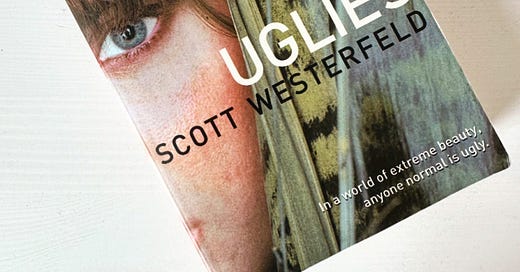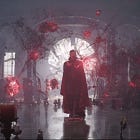This is the second essay in a series called Speculating on Fiction, in which we tackle big works of speculative fiction, thinking about their imagined worlds, their impact on characters and story, and what all of it is saying. Last week, we wrote about the works of Emily St. John Mandel.
Today, Neha and I appear as guests on the SSR podcast to chat with about Uglies by Scott Westerfeld. To go along with the episode, this week’s essay explores Westerfeld’s work of dystopian fiction by exploring themes of beauty and evolution. This essay contains only minor concept spoilers (no major character spoilers) which we hope will enhance your reading if you haven’t yet picked up the book.
In 2005, a few years before The Hunger Games cemented the dystopian genre, Uglies, by Scott Westerfeld, was published. The first in a series that eventually spawned multiple spin-offs, and is soon to be adapted into a Netflix movie, the book is set in a futuristic world where everyone’s natural state is considered ‘ugly’ and all citizens undergo an operation on their 16th birthday to make them ‘pretty.’ Tally Youngblood, the protagonist of the novel, is excited to become a pretty like her best friend Peris, until she meets Shay.
“Shay sometimes talked in a mysterious way, like she was quoting the lyrics of some band no one else listened to,” Tally tells us — Shay is different from everyone else, and as we slowly learn more about her, Tally’s world will be shaken to its core.
As the tagline of the novel tells us, in a world of extreme beauty, anyone normal is ugly.
“At school, they explained how it affected you. It didn’t matter if you knew about evolution or not — it worked anyway. On everyone. There was a certain kind of beauty, a prettiness that everyone could see. Big eyes and full lips like a kid’s; smooth, clear skin; symmetrical features; and a thousand other little clues.”
In Tally’s world, beauty standards don’t change like fashion trends. They are indicative of an evolutionary advantage, a manufactured solution to the problem of ‘survival of the fittest.’
“The big eyes and lips said: I’m young and vulnerable, I can’t hurt you, and you want to protect me. And the rest said: I’m healthy, I won’t make you sick… It was biology, they said at school.”
At the front of my copy of the book, even before the title page, there is a small note stating that the novel was created out of a series of email exchanges between the author, Scott Westerfeld, and Ted Chiang, about Chiang’s short story ‘Liking What You See: A Documentary’ which first appeared in his collection Stories of Your Life and Others.
In Chiang’s speculative story, people have the choice to undergo an operation to induce what’s known as calliagnosia (or ‘calli’ as the college students call it), which blocks certain neural pathways in the brain that create the feeling of beauty, ugliness, or any perception of physical attractiveness. Over the course of the story, we get varying perspectives from scientists, college students, administrators, and activists debating the ethics and effects of allowing such a technology to exist.
Chiang explores how beauty and perception of beauty affect our minds, the central thesis being that we don’t have conscious control over how we perceive beauty, and therefore need to physically interfere with our neural pathways to be objective. His story raises, but doesn’t answer the question: what is beauty?
Uglies explores this question, too, but I’m not sure what the answer is. When Tally, at one point in the story, meets a young man who has never had the operation despite being 18 years old, she feels a strange kind of attraction — a pull towards him despite her conscious mind telling her that he is ugly. Beauty, in this book, isn’t exactly superficial, like the operation leads us to believe, but it’s not exactly in the eye of the beholder, either.
There seem to be two types of beauty — the superficial, “natural” type, that indicates an evolutionary advantage; and a deeper, more personal kind that is borne out of an emotional connection. And when parsed out this way, it doesn’t actually seem that different from the real world that we live in: celebrities and models can achieve a picture-perfect symmetrical look through fillers, enhancements, airbrush, and plastic surgery. The only difference between us, and the characters in Uglies is that we have a choice.
And yet… do we? Only those with means (financial and otherwise) in our world can ultimately achieve traditional standards of beauty — whether through plastic surgery, expensive makeup and styling, injections, or simply good editing skills. Those without the means to do so can never achieve Vogue levels of ‘perfection.’ So, really, the imagined world that Tally Youngblood lives in may be more equitable than ours: though each individual cannot make a choice about how they want to look, at least everyone gets the same operation and, on some level, is treated the same.
But there are perils to this, too. If everyone is treated the same, is there any space for individuals to be unique? To have their own thoughts, preferences, and tastes?
The operation itself erases all the marks of childhood, wiping clean any individuality:
“They rubbed you raw, and you grew all new skin, perfect and clear. The old marks of accidents and bad food and childhood illnesses all washed away. A clean start.”
The erasure of childhood isn’t just the elimination of signs of illness; it also implies the destruction of everything we associate with childhood: innocence, trust, curiosity, affection, and also, our core memories.
In Tally’s world, children are not taught to write by hand; they are deprived of an entire mode of communication, a way of transcribing memories. And so it’s not just that the world they live in wants to standardize appearances and make everyone beautiful; the authorities are doing this in order to subvert and interfere with the natural order. And in the process, generational and evolutionary memory is destroyed.
Outside the city, there are renegades who live in opposition to everything the government stands for. They farm, make their own food, educate each other, live off the land, and never undergo an operation to change their appearance. And, as Tally discovers, everything there is much more raw, and, in a way, beautiful, than what she was used to.
“The strawberries were sweet without sugar, and although it seemed weird to eat it plain, the bread had its own flavor without anything added.”
As we learn more about this civilization’s history, we learn that the Rusties (ie, us) were destroyed by their own greed: a horrible consequence of the overuse of fossil fuels, and the way we exploited our world for personal gain.
“Maybe they didn't want you to realize that every civilization has its weakness. There's always one thing we depend on. And if someone takes it away all that's left is some story in a history class.”
Uglies takes beauty standards to an extreme, but when we dig a little deeper, we find that Tally’s world isn’t much different than ours. While they might have more advanced machines (including the hoverboards that we all thought would be commonplace by now), the desire for control over appearances and societies is a startling reflection of our own world. Uglies thrusts a mirror in front of us, forcing us to contend with the way we treat the natural world, and attempt to control time and science. The results are deeply troubling.
If you loved this essay, you’ll love our discussion with Alli on the SSR Podcast even more! Click here to listen to the episode and find bonus content through Alli’s Patreon.
Last week, we wrote about Emily St. John Mandel’s multiverse in the first essay in our Speculating on Fiction series. If you missed it, you can check it out here:
Earlier this month, on The Novel Tea podcast, we talked about the best books we’ve read this year, and gave out awards to best beach read, best character, worth the hype, and more! Check out the full episode here:






